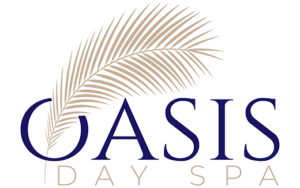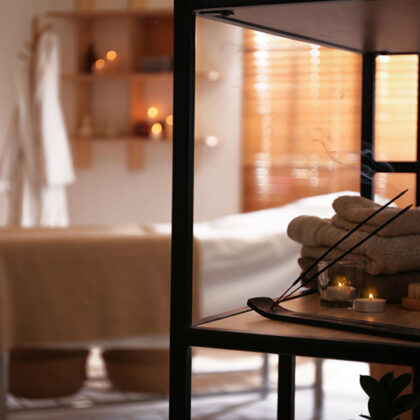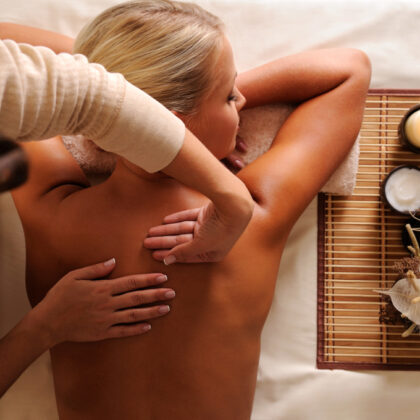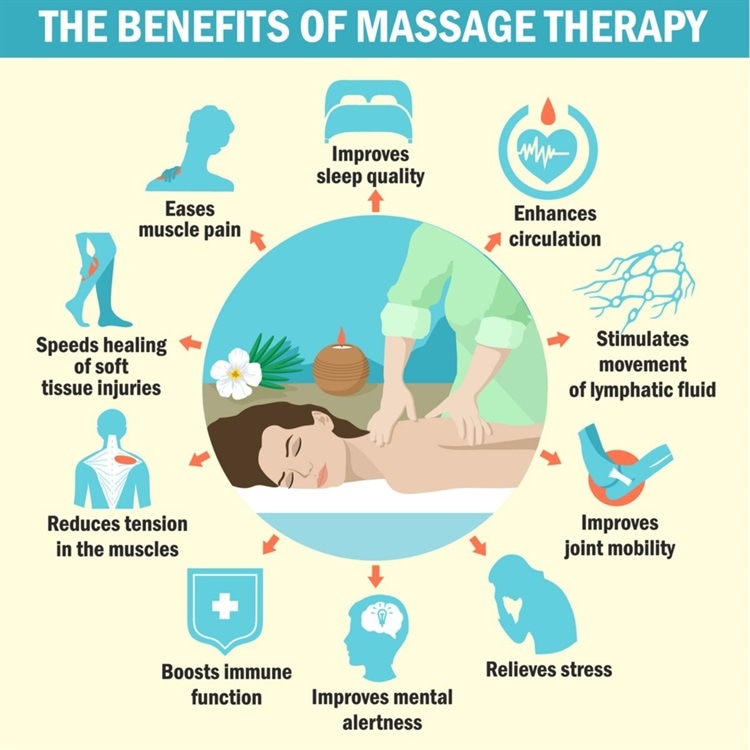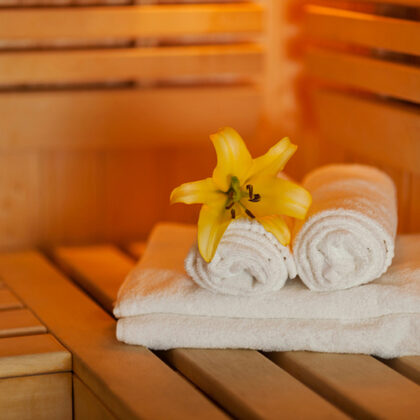4 Ways Massage Therapy Can Benefit Your Health
You’re on vacation. Maybe you’re feeling particularly stressed. Or, you just want to treat yourself.
There are plenty of reasons you might opt to get a massage for some much-needed relaxation. While massages are certainly relaxing and stress-relieving, these benefits may just be the beginning.
Massage therapy is when therapists manipulate your muscles and soft tissues using their hands, fingers, forearms and elbows.
On top of being relaxing, it can be used to manage certain health conditions, relieve pain and enhance your overall wellness
Antonio Luis, MD, physician at Spruce Internal Medicine
Massage therapy has been shown to relieve symptoms associated with conditions such as:
- Osteoarthritis
- Cancer
- Fibromyalgia
- Depression and anxiety
- General pain, such as low back pain or headaches
Massage therapy is not a new concept — it was one of the first tools humans used for pain relief
Dr. Luis
It’s practiced in many cultures around the world, and there is very little risk involved. And while the different kinds of massage therapy all have their own spin on the process, they each benefit your health in similar ways.
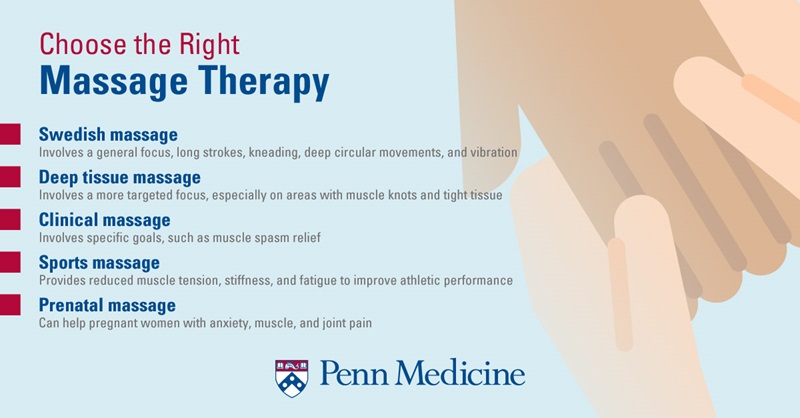
4 Benefits of Massage Therapy
1. It can relieve chronic pain — including headaches.
If you have pain in your lower back, neck or shoulders, you know it can be tough to find relief. You might try home remedies, such as stretching or heating pads, but still find yourself suffering from pain that just won’t go away.
Or, you may be a victim of frequent headaches, such as migraines or tension headaches. These can be just as stubborn and, similar to chronic pain, they can put a damper on your daily routine. Whatever your ailment, massage therapy may be the savior you never knew you needed.
“One theory why massage is able to combat pain is called the ‘gate theory,’ which says your brain can’t fully recognize pain when touch receptors are activated in the area,” says Dr. Luis.
This can occur when a massage therapist is rubbing your lower back, neck, shoulders or head.
Think about it the last time you bumped your elbow or your knee: was your first instinct to rub it? If so, you’re not alone, and you’re not necessarily wrong to do so. You may be activating the gate theory in a subconscious attempt to soothe the area that’s in pain.
2. It can boost your mood, relieve anxiety and fight depression.
Massages go hand-in-hand with resorts and fancy hotels, and there’s a reason for that — they simply ooze relaxation. While this may partially be because you’re on vacation, there’s also scientific evidence that suggests why massage therapy can improve your mental wellness.
Dr. Luis explains, “Hormones can have a significant impact on your stress levels, and massage therapy may be able to reduce the negative impacts and increase the positive ones. For instance, the stress hormone cortisol has been shown to drop more than 30 percent with massage therapy — and feel-good hormones, such as dopamine and serotonin, have been shown to increase by the same amount.”
This calming effect may be a result of the pressure massage puts on pain receptors under the skin, which can stimulate the vagus nerve — a major player in the nervous system. A relaxed nervous system can slow your heart rate down, lower blood pressure and impact hormones that are related to stress.
Of course, massage therapy also tends to occur in a soothing setting, complete with calming aromas, gentle music and dimmed lighting — all of which can leave you feeling just a little less stressed.
3. It can help you bounce back after a tough workout.
You know the benefits of working out, but the soreness that sometimes follows can be painful, and it may keep you from wanting to go back to the gym. Fortunately, a massage may keep soreness at bay so you can get back to your training sooner.
Anywhere between a few hours to a few days after you exercise, your muscles may begin to feel sore. That’s most likely because of inflammation within the muscle. While this is a good thing (it means you’re getting stronger), it can also hurt. Enter massage therapy — your solution to post-workout soreness.
“Getting a massage increases general blood flow, which can help alleviate soreness quicker,” says Dr. Luis.
And some studies have even shown that the improved blood flow from a massage can have a protective effect, preventing soreness from developing as a result of your next workout. If your muscles are burning after a particularly tough workout, don’t skip the gym for the next week — opt for a massage, instead.
4. It can alleviate the negative side effects of cancer and cancer treatments.
While massage certainly has its benefits for anyone, it may also provide much-needed relief for patients with cancer. Cancer patients often go through rigorous treatments, from chemotherapy to radiation, which can take a toll on their bodies as well as their mental well-being.
Massage therapy may reduce pain and anxiety associated with cancer and treatment. Even more, it may promote relaxation and serve as a mood-booster. “Though there are varying theories behind the benefit of massage therapy for cancer patients, it may have something to do with increased blood flow in areas of the brain that regulate pain and stress,” explains Dr. Luis.
Keep in mind: these benefits may only be temporary. Also, massage therapists may need to modify their approach with patients with cancer and use less pressure in sensitive areas affected by either cancer treatments or cancer itself.
Read more about oncology massage for cancer patients.
Who Shouldn’t Get Massage Therapy?
Though it’s certainly beneficial for many, massage therapy may not be for everyone.
“For instance, if your skin is inflamed and irritated, a massage may make it worse. Or, if you have certain medical conditions, such as diabetes, heart disease or epilepsy, a hot stone massage may not be the right type of massage for you,” explains Dr. Luis.
And while massages are generally safe for pregnant women, it’s important to talk to your healthcare provider to address any risks that may pertain to your individual situation.
If you aren’t sure if getting a massage is safe for you — or if you’re considering using massage therapy for a specific medical condition — talk to your healthcare provider beforehand.
Massage Therapy: A Flexible Treatment Option to Meet Your Needs
Massage therapy can be pain-relieving and relaxing, but it can vary a lot in terms of pressure and sensation. You may prefer a lighter touch or firmer pressure — just be sure to communicate that to your massage therapist.
Keep in mind: massage therapy doesn’t have to break the bank. You can still access the benefits of a massage at home by using a foam roller, a handheld massager or a massage pillow.
Whether you opt for an appointment with a massage therapist or you use a foam roller for five minutes, both versions of massage can provide benefits in their own way — and your body will thank you for the extra attention.
